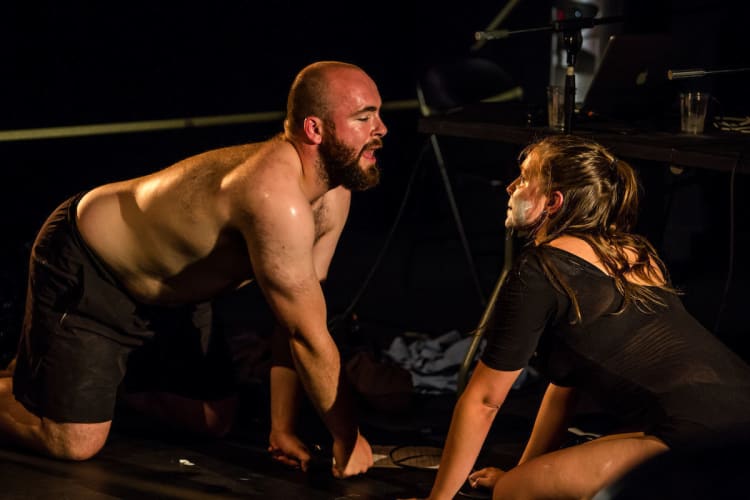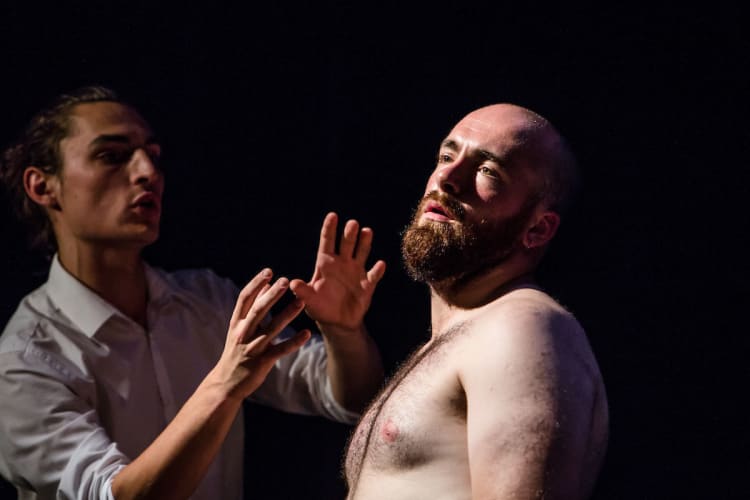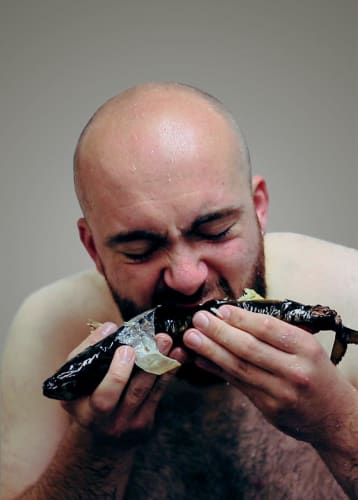In their previous show The Beanfield, multimedia theatre company Breach explored controversial historical events in a bold audio-visual performance form, questioning received narratives as well as the documentary format itself.
Their follow-up piece, Tank, takes a somewhat similar approach to a little-known set of linguistic and behavioural experiments carried out in early-1960s America. In the research, funded by NASA and the US Navy, dolphins were subjected to intensive attempts to teach them English, as a way of preparing the ground for potential extra-terrestrial contact.
These experiments, led by John Lilly and largely carried out by Margaret Howe Lovatt, included various highly unorthodox measures: a prolonged period of human-dolphin cohabitation in a custom-converted ‘Dolphinarium’, the endless repetition of simple words in an attempt to get the dolphins to replicate them with their blowholes, and even the injection of LSD. All of these clearly had potentially highly traumatic effects on the creatures; none provided any evidence of positive outcomes for the research, which soon lost its funding.
It is a remarkable, fascinating, and bonkers story, made all the more contentious by the close bond which sprung up between Howe Lovatt and one of the three dolphins, Peter, thanks to the intense and prolonged time she spent in close quarters.
Breach’s approach to the material is to present themselves as they attempt to figure out how best to tell this story. Tapes exist of the researchers’ findings, but they are fragmentary and decaying; much is open to interpretation.
Underlying the structure of the piece is an imagined, and constantly resketched, pitch for a film based on these events. The cast of four pass narrative duties slickly, each taking turns to tweak and lead the version we’re being told. They repeatedly touch on the urge to sensationalise—to make this into a human-cetacean love story or a tale of scientific ambition (or even lust) spiralling out of control.
There is some excellent use of music, especially in one wonderful, impressionistic segment blurring reality and LSD-induced hallucination. The cast performs very much as an ensemble, Sophie Steer stepping forward to take on the central role of Margaret. Joe Boylan is also excellent, called upon to play Peter, the dolphin, employing some remarkable, inventive physicality. This veers from extreme freak-outs, pushing endurance and intensity to extremes, to much more subtle insinuations of the delphinine nature of the beast. Not only for this is Boylan the most watchable performer onstage, among a likeable bunch.
But my main reservation about this otherwise fascinating and promising work is that these performers are indeed hemmed in to a rather arch presentational convention. Even when speaking directly to us (as they often do)—even when interrupting each other and correcting the story—they are distanced from us by the knowing, meta-aware ‘performance’ of the text: the interventions and interruptions did not, to me, feel like an organic development stemming from a desire to tell a story as truthfully as possible.
The video work, a real strong point of The Beanfield, also feels a little superfluous, as snippets of re-enacted pool-play between Peter and Margaret pop up and disappear, adding little to what is already a compelling tale without them.
The ‘imaginary film’ framework conjures echoes of Adler and Gibb, and many of the devices are resonant of Tim Crouch’s, or indeed Forced Entertainment’s work. It’s an enlightening telling of an enthralling story, with strong performances, but for me it’s a piece overwhelmingly aimed at the intellect rather than the emotions. If the company could lower their guard a little, if they could speak directly to us without the veil of irony and academic self-awareness, they would surely come yet closer to the greatness they are threatening.


